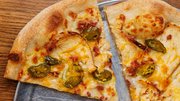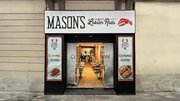Article
BBQ carves industry niche
Barbecue chains work to gain mainstream appeal.

June 26, 2007
When Darden Restaurants Inc. announced the May closure of 56 Smokey Bones Barbecue & Grill restaurants, and the potential sale of 73 other units, a temporary black eye was cast on the sustainability of barbecue restaurants.
Darden chief executive officer Clarence Otis said Smokey Bones was intended to be a nationally advertised brand that did not live up to expectations.
"Since it is not on a path to achieving this vision, we have concluded that it is not a meaningful growth vehicle," Otis said.
Darden's inability to sell the country on Smokey Bones appears to be an ominous sign for the barbecue fast-casual concept, but others believe it is only a matter of time before the pulled pork sandwich takes its place next to cheeseburgers and pepperoni pizza.
Bret Eldridge, vice president and brand leader for 63-unit Shane's Rib Shack, said while barbecue has a long way to go, there is another food item that gives him hope — the taco.
"My brother used to live in Phoenix and he'd call and say that people in Atlanta just didn't know good Mexican food," Eldridge said. "And 10 to 15 years ago that was the case.I think barbecue is 10 to 12 years behind the curve, but it's more mainstream now and will eventually catapult itself like Mexican food."
A matter of perception
As of last year, quick-serve restaurants more commonly featured barbecue on the menu than their fast casual counterparts. More than 53 percent of QSR operators featured barbecue products compared to 35 percent of fast casual restaurants, according to Datassential, a menu research firm in Chicago.
The problem for barbecue is a matter of perception.
Barbecue restaurants are typically small mom and pop stores in economically challenged locations, said Darren Tristano, managing director of Technomic Information Services in Chicago.
"When you're talking about fast casual you're looking at those that are trading up from limited service and trading down from casual dining," Tristano said. "It's a nice medium and in many cases dealing with more affluent, sophisticated customers. And they have specific needs in what they're looking for and barbecue is not necessarily at the top of the list."
As opposed to chicken and hamburgers, barbecue remains an acquired taste specific to both region and gender. Tristano said barbecue's popularity is mainly confined to the Midwest and South, and the country's limited experience with the product makes it a hard sell in places like Los Angeles and New York.
"Barbecue is trying to go more mainstream, but it's not a craveable item that is something you'd eat every night," Tristano said. "It's something where you have your barbecue and don't have it for a month. We've learned through the Darden's experience that it's very difficult to get people to eat barbecue every night of the week."
The majority of Shane's Rib Shacks are located in the southeast though it has recently expanded into more non-traditional markets, which has given Eldridge hope.
"Phoenix and south Florida were traditionally markets that weren't great for barbecue but we've been astounded by the success," he said.
Jeff Polsgrove, owner of Pig City BBQ in Louisville, Ky., said the other obstacle standing in the way of widespread-barbecue proliferation is the most important to overcome — women.
"Most people think if you get the guys, that's your market," Polsgrove said. "But if you don't overcome the wife's objection to barbecue you're going to have a hard time drawing in that additional business. If the guy wants barbecue the wife will say let's go to Applebee's because he can get the riblets and she can get what she likes."
| |||||
 | Free Special Publication Downloads Download informative guides, special reports, case studies and white papers for free. | ||||
The first key toward overcoming women's aversion to barbecue restaurants, largely seen as a sloppy domain for men, is the décor. Eldridge said the founder of Shane's Rib Shack told him one simple rule — no pigs and no pits.
"Traditionally, there's a smoky pit and pigs everywhere, and that's not what we wanted to do," Eldridge said. "We wanted to be more modern and clean so the ladies were more apt to come. The place is not what you think of when you think of traditional barbecue."
Even though Polsgrove broke the "no pig" rule by naming his restaurant Pig City, he agrees that creating a classy environment is the key to attracting women. He also said it's important to provide food other than barbecue, which is why they put so much emphasis on the eatery's side dishes.
"Guys like barbecue, that's a given. So we focused on how to attract women and all of our side items are hugely popular among women," he said. "We also made our bathrooms really nice and we don't have a lot of farm implements hanging on the walls. We want to make sure the wife is happy so if the guy says, 'I want barbecue,' the first words out of her mouth are, 'Only if it's Pig City because they have good sides and a clean bathroom.'"
Tristano said the lack of appeal to women is one of the reasons Darden's Smokey Bones concept, a restaurant mixed with a sports bar environment, failed.
"I think they discovered it wasn't very appealing to women," Tristano said. "The food is messy and not something women want to eat in a bar. And if you can't attract females, who are the majority of Americans, it makes things very difficult."
In New Orleans, the five-year old, homegrown Voodoo BBQ chain has found a niche in a city known for its legendary restaurants.
Chief executive Tony Avila said they have two locations, a third opening this year and are in the process of franchising the concept. But it wasn't an easy concept to sell at first, he said.
When they opened their Baton Rouge location the customers didn't know what to make of it.
"People expected a sit-down restaurant and maybe associated counter service with fast food, but the prices weren't fast food prices," Avila said. "They didn't know what they were going to get for their money, but now it's our most successful store. New Orleans is still a Cajun and seafood town and will never be mistaken for Memphis, Kansas City or Texas so far as barbecue concepts popping up all over the place. But like in any city, if the food is good and consistent you'll be successful and if it's not you'll never make it."
Related Media
Food & BeveragePresented ByOracle
Presented ByOracle
 ChatGPT
ChatGPT Grok
Grok Perplexity
Perplexity Claude
Claude












